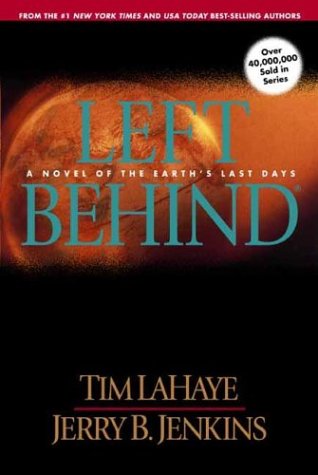Left Behind: What do these novels say about American culture?
The Left Behind series of novels is one of the biggest publishing phenomenons of the past twenty years, second only to the Harry Potter series in popularity. What makes the 65 million copies sold of the series twelve installments that much more amazing is that the books remains largely unread in Europe or other developed countries outside of North America. In fact, the vast majority of the series readers live in the Southern or Western parts of the United States. Even as the series crept onto the New York Times bestseller list with the third installment most of the big publishing houses had not heard of Left Behind. Created by Christian Evangelical Preacher Tim LeHaye and popular Christian Fiction writer Jerry Jenkins the series tells an apocalyptic story where all faithful Christians are taken in the Rapture leaving all members of other faiths, non-believers and some Christian denominations behind to face a world controlled by the Anti-Christ.

Once the series had caught fire and entered the popular zeitgeist, it became a lightning rod for controversy. Catholics, Jews and Muslims voiced disapproval of their depictions in the series. Secular media and mainline Protestants alike expressed concerns about the series intolerance. Others were concerned about the series close melding of far right wing politics and dubious Christian theology. Even some Evangelical Christians were upset with the series for playing fast and loose with scripture or for simply not being intolerant enough. Some evangelical preachers disapproved of a scene where the Pope is “raptured”, though most Catholics are left on earth, and still others found the idea that people could still be saved after the Rapture at all to be offensive.
As the brainchild of evangelical activist Tim LeHaye, the controversy should not have been surprising. As a leader of the religious right for decades LeHaye had been as responsible as anybody for politicizing religion. He had also written many books about Rapture belief, often referred to as premillennial dispensationalism by scholars, a dubious Christian interpretation of the book of Revelation. The book of Revelation has always been the bible’s most controversial book but at the same time has been easily exploited by opportunists. Protestant reformer Martin Luther disliked the book so much that he considered removing it altogether until he realized it could be used to stir his followers against Catholics and turn the Pope into a candidate for the antichrist.
Catholics have been most vocal against the Left Behind books. This is not surprising considering they are the only Christian faith singled out to be left out of the Rapture. The Catholic church has positioned itself as a “non-carnal” take on Revelation which does not jell with the more literal version of many protestants or outright fanciful one portrayed in the Left Behind books and other apocalyptic fiction. When Nicolae Carpathia, the books villain portrayed as the antichrist, takes over the world he institutes a world religion that is a combination of Catholic rituals and Satanist beliefs.
The books relationship to the Jewish faith is a little more complex. Of all the groups to protest Left Behind, Jews have been the quietest. There are many Jewish characters in the series because much of the action of the books revolves around Israel and the faith portrayed by LeHaye is a Zionist Christian belief that needs the Jews to reclaim the holy land in order for the end times to come. This puts Jews in a strange position. From Christian leaders like Lehaye they get enthusiastic support for Israel but they also are portrayed in his books as reluctant converts or foolish hold outs that are eviscerated or burned to death by Jesus in the final novel.
Perhaps the most offensive to many secular critics are the politics of Left Behind. More than one scholar has viewed the series as conspiracy literature that rivals The Protocols of the Elders of Zion, the famous anti-Semitic book that still is a favorite among white supremacists worldwide. When Carpathia brings the world under his control he does so through the United Nations and disarms the populace pushing his agenda of secular humanism and buying up the entire worldwide media. This is an obvious representation of the tropes of standard far right wing paranoia. To call it allegory would be an insult to the term.
Even Amy Johnson Frykholm, a literature and religion scholar whose book Rapture Culture examines Left Behind, can’t help but find the books offensive even though she grew up an evangelical Christian and once taught Sunday school. The books are so extreme in places that they seem almost to be unintentional satire of stereotypes of evangelical Christians. In the first book one of the heroes decries his Ivy League education for steering him away from God and in the final book Jesus confronts Satan with the line, “Despite your lies about having evolved, you are a created being.” before tossing him into the lake of fire.
Despite the accusations of the intolerance of the series fueling a persecutions complex in Evangelicals, the chiefly negative attention from the media and scholars may be adding more fuel to that fire than the books ever could. In his book, Left Behind or Left Befuddled, college professor and ordained minister Gordon Isaac, goes to great lengths to examine scripture and LeHaye’s claims side by side to show that Lehaye doesn’t stay true to his claim of a “literal”interpretation.He then goes on to criticize fundamentalism as an authoritarian system of oppression and tell “responsible Christians” that it is their duty to oppose these books. This defeats the purpose of his previous examining of scripture, appealing to the one common ground he has with evangelicals in the scripture, and then only a chapter later attacking their entire belief system.
The previously mentioned Amy Frykholm thinks this is the wrong tack to take with the series and with evangelicals in general.She criticizes other scholars who did not have an evangelical upbringing like herself, for viewing evangelical Christians as an isolated group that has little or no engagement with the rest of American culture. While she finds the books to be offensive herself, she points out that they are more tuned into the greater American cultural zeitgeist than previous attempts at popularizing Christian apocalyptic beliefs and she credits this to the influence of Jenkins over LeHaye’s anachronistic worldview and believes that this is the secret to the books success in the mainstream market.
For her book Frykholm conducted an extensive study of the Left Behind readership and conducted hundreds of personal interviews with Left Behind readers to discover how they viewed the books in relationship to their religious beliefs and the greater popular culture. Frykholm found that many of the readers held beliefs that contradicted those held in the series and read the books more to connect with people in their church or family members that read the series. Some went to churches that disapproved of the series either because they did not believe in the rapture or had a different view of the rapture than those expressed in the books. While Frykolm did find many readers that fit the stereotypes expressed through the media most were more open to the views of others than would have been thought by many secular critics. Many had family that did not share their beliefs.
One interview that Frykholm conducted involved a woman who had been raised evangelical but had converted to Catholic when she married her husband. Though she preferred her new faith, she continued to believe in the Rapture and read the Left Behind books. Her husband read the first book to try and connect with her but found the book poorly written and offensive. A similar result was found through an interview with a mother and daughter. The daughter had been born again but the mother had rejected religion entirely. Just like the previous example the mother had read Left Behind in an attempt to connect but had found the book offensive. In both cases the disconnect caused those involved a great deal of pain though they made a strong effort to accept the others beliefs.
Frykolm also began to question her own reading of the books. As a feminist, she was especially interested in the gender roles of the characters in the novel. Though she found the book sexist she did note that there were moments when the female characters showed a surprising strength. When she interviewed woman who read Left Behind Frykolm found that gender roles were not what interested them about the book and most described the female characters as “strong” characters. They also said the same of the male characters. While female readers of Left Behind showed some concern about changing gender roles in society they were more concerned about men having a public dominance. They believed in female equality in matters of faith and family and most worked outside the home and had some college education but they did see the traditional patriarchal structure of the family and public society as important to their values.
Frykolm accuses secular readers and those of other faiths of partaking in a “paranoid” reading of Left Behind. She sees even in herself a tendency to look at the series in a way that confirms the worst fears of evangelical Christians and a tendency to see them as a monolithic group that does not ever engage in mainstream society. Many scholars see the identification of believers with the unbelievers left behind after the Rapture as a kind of oddity but see it as serving one purpose in LeHaye’s mind, that of conversion of nonbelievers through the books. While Frykolm has no doubts that this was part of the goal of the series she is unable to find a single person who admits to being converted by Left Behind in her study.
What seems apparent is that a lot of the media attention to Left Behind assumes that evangelical Christians all read it blindly and that the books can possibly convert millions of others to this mindset. While evangelicals are paranoid about societal progress those with a more progressive mindset seem to be unduly paranoid about Left Behind and the ability of evangelical Christians to impede the progress of American culture. Nothing makes this more apparent than the growing influence of the internet in popular culture.
Many scholars point out the internet’s strange role in Left Behind. While many evangelicals still fear technology, that is a role of evangelical life that has changed somewhat. When the antichrist takes over the media, the book’s heroes, The Tribulation Force, turn to the internet to get out their message. All one has to do is turn to today’s internet to see how this is a mirror image of what we see in today’s society. There are hundreds of evangelical websites ranging from the emotional and inspiring to the outright reactionary and offensive. On blogs, a secular humanist from Massachusetts can debate an evangelical premillennialist from Alabama without either leaving their living room. The result is that the world seems a lot smaller and people who never would have met have their views clash violently in cyberspace.
This may be the real key to understanding both Left Behind and the backlash it receives in the media. In the past it was easier to ignore the world outside your own religious mindset but now, for evangelicals, they have both a new tool to reach more people than they ever had before and a medium by which they can encounter more worldviews they might find upsetting. For other religions this means more exposure to Evangelical culture than before creating an illusion that evangelical Christianity is growing faster and has more influence on the culture than it ever had before even though the opposite may be true. Add to this the fact that secular humanism is growing at a faster rate and exerting more political power than before and you have an idea of what is changing rapidly in the American religious landscape and can see that these are just the growing pains of an inevitable shift in culture, the consequences of which we do not yet fully understand.









